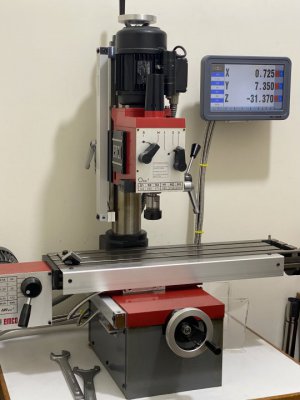- Joined
- Jan 1, 2022
- Messages
- 19
Apologies if this has been covered already. If so, point me to the thread and I'll delete this one.
I'm interested in buying a bench top mill. I'm trying to figure out the tradeoffs (besides workpiece size) between something like a Sherline 12"/14"/18" mill, an LMS 3990/6500/6700, or Precision Matthews PM-25 or PM-728VT. I can read the specs, I get that heavier and more rigid is better. I guess what I'm really wondering, is could I "go cheap" on smaller Sherline machine to get started, and if I get hooked in this hobby I'd have more experience and know more about what I wanted in a next machine. This happened to me in 3D printing. I bought my first, built my second.
So, what couldn't I do on a Sherline? From other posts, it looks like it will handle aluminum and mild steel, which feels like it'll be fine for But if I had something harder occasionally, could the smaller machine handle it as long as I was patient and took light cuts? I also assume that I'm giving up some precision, but my guess is that since I'm learning most problems will be my fault. Is it possible to expect 0.001" precision once I build the skill and I'm careful?
I guess I'd might end up replacing tooling if moving from a Sherline-sized machine to PM-sized machine? But a lot of the related tools like parallels, indicators, gauges, would be the same.
I'm interested in buying a bench top mill. I'm trying to figure out the tradeoffs (besides workpiece size) between something like a Sherline 12"/14"/18" mill, an LMS 3990/6500/6700, or Precision Matthews PM-25 or PM-728VT. I can read the specs, I get that heavier and more rigid is better. I guess what I'm really wondering, is could I "go cheap" on smaller Sherline machine to get started, and if I get hooked in this hobby I'd have more experience and know more about what I wanted in a next machine. This happened to me in 3D printing. I bought my first, built my second.
So, what couldn't I do on a Sherline? From other posts, it looks like it will handle aluminum and mild steel, which feels like it'll be fine for But if I had something harder occasionally, could the smaller machine handle it as long as I was patient and took light cuts? I also assume that I'm giving up some precision, but my guess is that since I'm learning most problems will be my fault. Is it possible to expect 0.001" precision once I build the skill and I'm careful?
I guess I'd might end up replacing tooling if moving from a Sherline-sized machine to PM-sized machine? But a lot of the related tools like parallels, indicators, gauges, would be the same.

